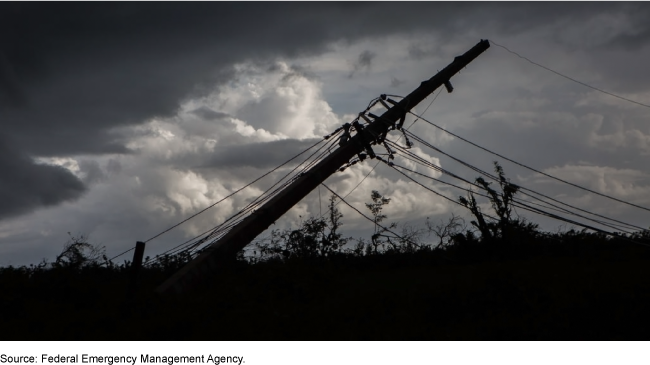A Framework for Managing Improper Payments in Emergency Assistance Programs
Fast Facts
Payment errors, including those resulting from fraud, can plague federal assistance programs—especially for emergencies like COVID-19 and hurricanes. Our oversight has shown us how agencies can do more to manage risks and catch these issues before they occur.
To help, we created an overall approach with these steps for agencies:
Commit to managing payment errors
Identify and assess risks
Design and implement controls—e.g., procedures to verify recipient eligibility
Monitor the controls' effectiveness
Get and share information on payment errors
We also give examples of how these steps can address specific emergency assistance risks.
Hurricane Maria Damaged Power Lines in Puerto Rico in November 2017

Highlights
What GAO Found
Improper payments—payments that should not have been made or that were made in an incorrect amount, including those stemming from fraud—are a long-standing problem in the federal government. Since 2003, the federal government has paid an estimated 2.4 trillion in improper payments.
In emergencies, the risk of improper payments may be higher because the need to provide assistance quickly can hinder the implementation of effective controls. Agencies may need to develop new programs or significantly expand existing ones, which can involve increased risks.
GAO’s work has shown that federal agencies can better plan for and take a more strategic approach to managing improper payments in emergency assistance programs. This framework provides Congress and federal agencies with an overall approach to preventing and reducing improper payments in emergency assistance programs. Applying the five principles of GAO’s framework (shown below) can help address the increased risk of improper payments during emergencies.
Framework for Managing Improper Payments in Emergency Assistance Programs

Why GAO Did This Study
Natural disasters are projected to increase in frequency and intensity. These events, as well as pandemics, cyberattacks, and terrorism, have highlighted challenges federal agencies face in responding to emergencies.
The CARES Act includes a provision for GAO to report on its ongoing monitoring and oversight efforts related to the COVID-19 pandemic. GAO developed this framework as part of its work in response to this provision. To develop this framework, GAO reviewed relevant laws and federal guidance, as well as relevant literature. GAO also consulted with GAO specialists on internal control, fraud risk management, and improper payments. Further, GAO interviewed federal officials and representatives from interagency organizations and federal, state, and local audit associations.
For more information on fraud risk, contact Johana Ayers at AyersJ@gao.gov. For more information on improper payment risk, contact Beryl Davis at DavisBH@gao.gov.
